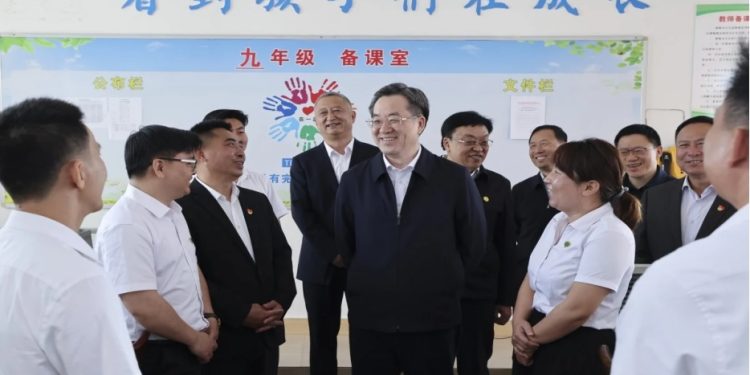‘Backed by the motherland’, Hong Kong’s chief executive vows more integration into nation’s development strategy after vice-premier stresses importance of regional cooperation mechanisms’.
In the face of trade protectionism and rising global uncertainties, China and the entirety of Asia can find ways to work together, one of China’s high-ranking vice-premiers said, while reiterating support for foreign investors “regardless of external changes”.
Speaking on Thursday at the Boao Forum for Asia, Ding Xuexiang, the sixth-ranked member of China’s Politburo Standing Committee, reaffirmed Beijing’s commitment to propping up the economy with more proactive macro policies and the fostering of emerging industries.
“An important lesson behind Asia’s dynamism and growth potential is its openness,” Ding said. “We should … firmly oppose trade and investment protectionism and make full use of cooperation mechanisms in regions such as East Asia and the Asia-Pacific.”
And in line with Beijing’s broadly stepped up efforts to help private firms, including by collecting back-owned payments, Ding again stressed the importance of further supporting private firms.
Ding also reaffirmed that China was “confident” in reaching its annual growth target of “around 5 per cent”, adding it would “undoubtedly make new contributions to the progress of Asia and the world”.
Citing Ding’s speech, Hong Kong Chief Executive John Lee Ka-chiu said that “the more complex and uncertain the external environment, the more steadfast Hong Kong must be in moving forward”.
He added that the city would leverage the unique advantage of being “backed by the motherland and connected to the world” to drive economic growth and further integrate into the nation’s development strategy.
Chinese Premier Li Qiang meets US Senator Daines: calls for frankness, deeper trust
“Hong Kong will further deepen international cooperation and, together with the nation and other Asian countries, enhance mutual trust and solidarity, openness and connectivity … to drive Asia’s economic development and promote global economic integration,” Lee pledged on his Facebook page on Thursday afternoon.
He also urged the city to adopt a “breakthrough” mindset in advancing reforms; to accelerate the establishment of an international innovation and technology hub; to further strengthen its position as a global financial, shipping and trade centre; and to attract top international talent.
The comments from Ding and Lee came after Premier Li Qiang similarly said on Sunday that China was prepared for bigger-than-anticipated external shocks and would open up more sectors of the nation’s economy to international investors, during his opening address to the China Development Forum.
At that forum, attended by more than 80 top executives of leading foreign multinationals, Li also reiterated a vow that China would roll out new policies to ensure the smooth operation of its economy.
The Boao Forum – an annual gathering of high-level officials, academics and business executives – is being held in the southern island province of Hainan until Friday.
Last summer, Ding was entrusted with more power in the leadership hierarchy by being named head of the Central Science and Technology Commission.
To reach the unchanged economic growth target amid stronger external headwinds, Beijing has been amplifying efforts to boost consumption while addressing the ongoing property crisis and employment challenges. These measures serve as counterweights to rising US tariffs, which have already slowed China’s year-on-year export growth to 2.3 per cent in the first two months of 2025 – a significant drop from December’s 10.7 per cent surge.
The US raised duties on all Chinese goods by 20 per cent this month and was reportedly preparing to roll out a broader reciprocal tariff regime next month. For its part, Beijing has applied additional duties on select agricultural products and placed export controls on 15 American firms with alleged ties to the defence sector.
Earlier this month, China released a 30-point action plan to stimulate consumption, including measures to raise incomes, establish a national birth-subsidy system, and enable local governments to purchase unsold homes via special bonds for conversion into subsidised housing.
China reported a 4 per cent growth in consumption in the first two months of 2025, while industrial output growth edged up 5.9 per cent.
Seeing a “stronger than expected” starting point, Morgan Stanley upgraded China’s 2025 economic growth forecast by 50 basis points to 4.5 per cent on Monday, following similar moves by HSBC and the Organisation for Economic Co-operation and Development (OECD) last week.
Morgan Stanley further expects a “higher contribution from capital formation to GDP, supported by emerging industries amid AI adoption and public funding support”.











